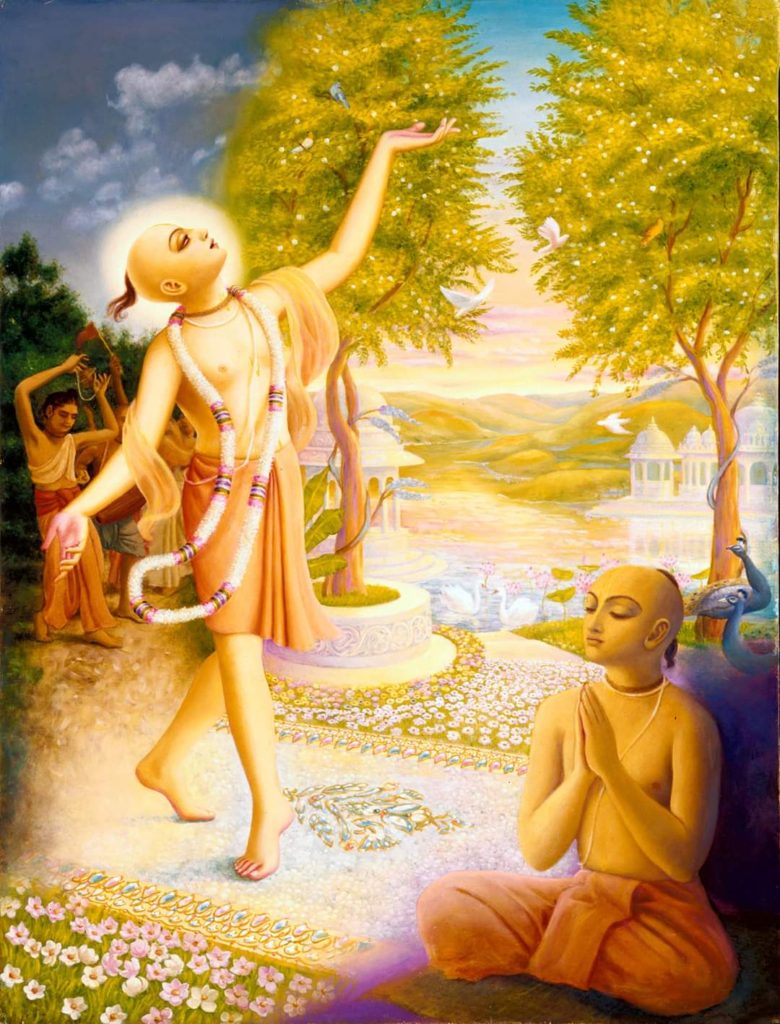We hear in the scriptures that it’s possible to serve Krsna in our minds. We hear for example the story of the poor Brahmana who started cooking sweet rice for Krsna in his mind and was surprised when he burned his finger when he touched the pot of hot sweet rice in his meditation, showing that Krsna was actually accepting his mental service.

One could then conclude that there is no need for us to strive to build temples or cook nice offerings for the deities since we can just do everything within our minds. However, we also see passages of Srila Prabhupada discouraging it. See this one for example:
“Nirjana-bhajana—cultivating Kṛṣṇa consciousness in a solitary place—is not possible for the neophyte, for he will be disturbed by the bodily necessities (eating, sleeping, mating and defending). Being so disturbed, one cannot cultivate Kṛṣṇa consciousness. We therefore see that devotees known as sahajiyā, who make everything very easy, do not associate with advanced devotees. Such persons, in the name of devotional activities, are addicted to all kinds of sinful acts—illicit sex, intoxication, gambling and meat-eating. There are many so-called devotees passing themselves off as devotees while engaging in these sinful activities. In other words, one who is influenced by sinful activity cannot be accepted as a person in Kṛṣṇa consciousness. A person addicted to sinful life cannot develop Kṛṣṇa consciousness, as indicated in this verse.” (SB 4.29.41)
This is explained by Krsna in the Bhagavad-Gita. On 6.3 He declares that:
“For one who is a neophyte in the eightfold yoga system, work is said to be the means; and for one who is already elevated in yoga, cessation of all material activities is said to be the means.”
“Work” (or Karma) is a word used in the Bhagavad-Gita in several different contexts. Here the word “Karma” (work) refers to two things: to perform our duties and to work for Krsna. When Krsna says that “For one who is a neophyte in the eightfold yoga system, work is said to be the means” it means that when one is starting in the process of devotional service (or in any process of yoga) he can advance by continuing performing his duties and gradually evolving to the platform of Karma-Yoga, where he works in Krsna Consciousness. For us, it means to physically perform different services. At this stage, it’s not possible to advance by just meditating, because we lack the proper concentration to do so. Our minds are very agitated and thus the only way for us is to directly perform activities for Krsna. At this stage we can only serve Krsna using our hands, so to say.
On the other hand, for one who is advanced in devotional service, He says, “cessation of all material activities is said to be the means”. As one advances in spiritual life, his mind gradually calms down and he gains the capacity of deeply meditating on Krsna’s qualities, activities, and so on. When this meditation becomes sufficiently strong, he can directly serve Krsna inside it, without having to physically perform activities. He may still perform physical services to give an example, but at this stage, it is not really necessary.
At this stage, the activities a devotee performs in his mind are not just dreams but actual activities performed using one’s spiritual body. The process of Ekadasa-Bhava that Srila Bhaktivinoda Thakura mentions in his books, for example, is based on this process, and can thus be practiced only by very advanced Vaishnavas who would usually retire from society and perform their meditation in secluded places.
Prabhupada alerts us that one who tries to imitate this practice without proper spiritual realization ends up just becoming a Sahajiya, trying to attract adoration from the public by posing as a renunciant while his mind is still attracted to all sorts of sinful activities.
Nirjana-Bhajana, or silently meditating on Krsna in a solitary place is thus possible only for advanced devotees who have developed a genuine attraction for Krsna and are able to fully control their minds. For them, stopping other activities and focusing on their meditation and solitary chanting is the process to advance.
For a neophyte, however, the same process is highly ineffective, because his disturbed mind will not allow him to successfully meditate in this way. He will then just go back to his previous habits, or will become some kind of Sahajiya or bogus guru, trying to externally act as some kind of Sadhu while secretly doing all kinds of sinful activities. Srila Bhaktisiddhanta Sarasvati Thakura alerted us against it in many of his writings, a message that Srila Prabhupada was also repeating. As he explains in SB 4.28.33:
“This nirjana-bhajana, which is the silent worship of the Supreme Lord, is not possible for a neophyte devotee. Śrīla Bhaktisiddhānta Sarasvatī Ṭhākura never advised a neophyte devotee to go to a solitary place to engage in devotional service. Indeed, he has written a song in this connection:”
“My dear mind, what kind of devotee are you? Simply for cheap adoration you sit in a solitary place and pretend to chant the Hare Kṛṣṇa mahā-mantra, but this is all cheating.” Thus Bhaktisiddhānta Sarasvatī Ṭhākura advocated that every devotee, under the guidance of an expert spiritual master, preach the bhakti cult, Kṛṣṇa consciousness, all over the world. Only when one is mature can he sit in a solitary place and retire from preaching all over the world.”
For us, the way to advance is to associate with other devotees and perform different services. By doing so, we will be able to advance and gradually be also able to see Krsna in our meditation. One who is not prepared to accept this path and prefers to go to a solitary place to sit down and meditate, despite the disturbances created by his mind, may lose the opportunity.
